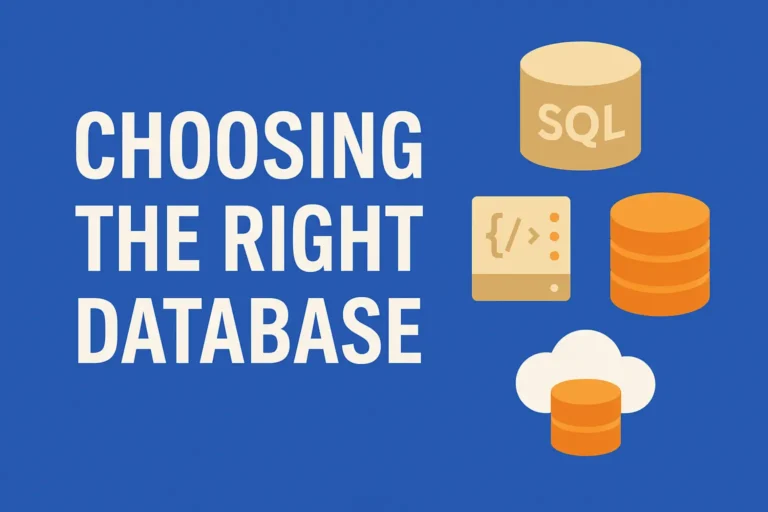
When starting a web or app development project, one of the most important decisions you need to make is choosing a database. The database acts as the backbone of your application. It stores your data, retrieves it efficiently, and supports the functionality your users rely on every day.
At Pegotec, we understand that this decision can be complex. There are many options available, and each comes with its own set of strengths and trade-offs. That’s why we work closely with our clients to choose the best solution for their unique needs. In this guide, we’ll explain the key types of databases and how we help clients navigate these choices for long-term success.
Understanding What a Database Does
A database stores structured or unstructured data. This data can be anything from user profiles and product listings to payment history or real-time analytics. Every app or website relies on a database in some way.
Selecting the correct database and designing it effectively can enhance performance, support scalability, and lower costs. The wrong one can slow things down, make scaling harder, and increase development time. That’s why this decision needs to be made thoughtfully and promptly.
Relational Databases: The Reliable Classic
Relational databases, also known as SQL databases, encompass systems such as MySQL, PostgreSQL, and SQLite. These use structured tables and relationships to organize data. They are perfect for projects that require strict consistency and complex queries.
For example, if your application requires handling financial transactions or storing customer data with clear relationships, a relational database is often the best fit. These systems are ACID-compliant, which means they support transactions with integrity.
At Pegotec, we often recommend PostgreSQL for enterprise-level systems that require advanced features and strong reliability. We also use MySQL for projects that require a balance between simplicity and power.
NoSQL Databases: Flexibility for Modern Needs
NoSQL databases, such as MongoDB and Couchbase, are better suited for handling unstructured or semi-structured data. These databases offer more flexibility and are easier to scale horizontally. They are ideal for fast development cycles and modern use cases, such as content management, real-time data syncing, or Internet of Things (IoT) applications.
If your app needs to store user-generated content, dynamic schemas, or large volumes of data without strict rules, NoSQL might be your best choice.
Pegotec has extensive experience integrating NoSQL databases into scalable cloud-based systems. We help clients utilize MongoDB effectively, ensuring optimal performance and ease of maintenance without compromising security.
In-Memory Databases: Speed When It Matters Most
Some projects need speed above all else. Redis and Memcached are in-memory databases that keep data in RAM, making them incredibly fast. They are an ideal choice as a database for real-time analytics, user session storage, or caching frequent queries.
While not ideal for storing critical data in the long term, in-memory databases are a valuable addition to a hybrid system. Pegotec often implements Redis as part of a high-performance caching layer for apps that must respond instantly to user actions.
Cloud Databases: Scalable and Hassle-Free
Cloud-hosted databases, such as Amazon RDS, Azure SQL, and Google Firestore, offer numerous advantages. These services provide automatic scaling, backups, and failover support. You pay only for what you use, and you don’t need to worry about managing servers or hardware.
At Pegotec, we design and deploy cloud-based architectures utilizing these services to provide our clients with flexibility and peace of mind. Whether it’s a startup looking to launch quickly or an enterprise aiming for global availability, cloud databases help us deliver scalable, secure solutions.
How Pegotec Helps You Choose the Right Database
Choosing the correct database is not just about comparing features; it’s also about understanding the underlying principles. It requires understanding your business goals, your users, and your expected data load. That’s where Pegotec’s consulting and development expertise comes in.
We begin each project with a discovery phase. Together with our clients, we answer questions like:
- What type of data will your app handle?
- Do you need real-time performance or advanced reporting?
- How much traffic do you expect now and in the future?
- What are your hosting preferences or compliance requirements?
Based on your answers, we propose the best-fitting database or combination of databases. Our development team then builds a secure, scalable, and maintainable solution around it.
Supporting You After the Launch
At Pegotec, our support doesn’t end with development and database choosing. We monitor database performance, help scale your solution, and offer ongoing maintenance. We also provide GDPR-compliant hosting and data solutions when needed.
Clients benefit not only from our custom development services but also from our long-term commitment to their success. Whether you need query optimization, data migration, or simply advice on how to grow your database as your business expands, Pegotec is here to help.
Final Thoughts
The database you choose will shape your project’s performance, flexibility, and growth potential. With so many choices, it’s essential to select wisely—and not alone. At Pegotec, we guide you through this decision and implement the technology that best serves your vision.
Contact us today if you’re starting a new project or need to enhance your existing system. Let’s build something substantial, beginning with a solid foundation.
Need help with your project?
Book a free 30-minute consultation with our developers. No strings attached.